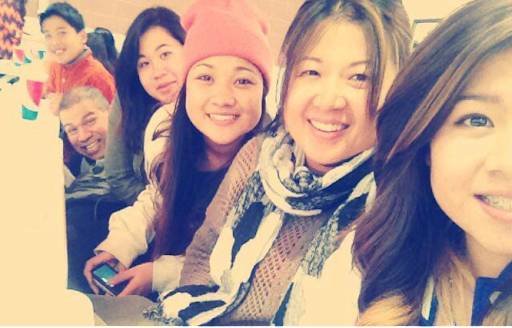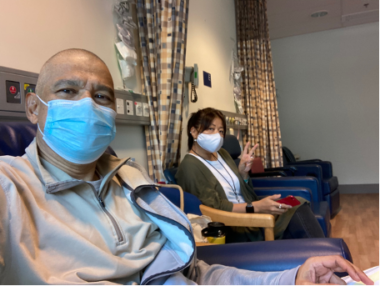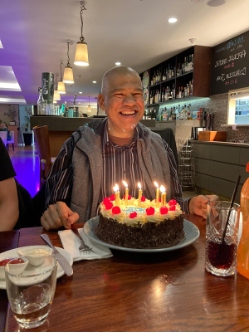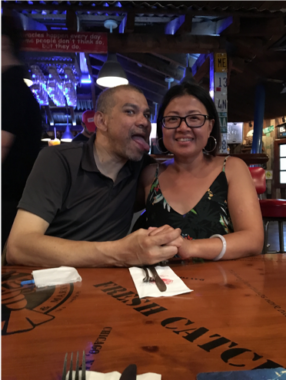Caregiver’s compass: Guiding your loved one through hATTR amyloidosis
Written by Jaime Christmas, March 14, 2024
Having a genetic disease is one of life’s greatest calamities. I say this from my own experience, having been married for almost 27 years to someone who was diagnosed with hereditary ATTR amyloidosis in 2013.
The mutated gene that took the life of my husband on May 22, 2022, and conscripted me into his caregiver now continues to haunt me. I believe that any of our four children also could carry it. The burden of this reality taunts me like an overcast sky, the air thick with something dire, and I recognize that the storm will break in due time.

Aubrey, Jaime, and their four children are pictured during a holiday in the U.S. in 2012 before Aubrey was diagnosed with hereditary ATTR amyloidosis a year later. (Photos courtesy of Jaime Christmas)
The only hope I have for them is that when the disease starts taking hold, modern medicine will present a cure. It must. I cannot live another lifetime of seeing them go through the same fate as their father.
Aubrey and I were married in March 1995 in Malaysia. One month before popping the question, he confessed that his grandmother and dad had died from a rare condition. Back then, there wasn’t any label for the disease — identifying the misfolded protein was not feasible in Malaysia, where they lived. The disease possibly took the lives of other family members. Both of us, naive and in love, decided not to fear something that may not touch us. Looking back, the future held so much promise.
It was only later, after we started having children and heard talk of another aunt falling sick with the same symptoms or a cousin who had undergone testing, that the reality began to take hold of our hearts. Yet we assured ourselves that Aubrey was immune to it. If we lived right and did well, this “strange” illness would not befall us. How wide-eyed and ignorant we were.
In 2013, almost a year after the loss of his brother, Aubrey sat down to breakfast and, for the first time in his life, couldn’t taste the flavor of his food. Just like that, our greatest fear came through. The storm finally hit. Aubrey and I were tossed into a space where we both were briefly lost.
When the dust finally settled, and we each came to terms with the reality of our situation, we decided that our only option was to find purpose within the new season. No matter what, we would stay committed to our relationship, especially our four children.
Looking back, I can pinpoint three coping traits. These avenues of life came about organically as Aubrey and I embarked on a learning journey. Life decisions sharpen when your days are counted. Once we overcame the fact that his condition was terminal, unless a cure came along, the tempest within us calmed.

Aubrey receives outpatient treatment for his fluid retention at Auckland hospital in 2021.
Patience
With his declining health, Aubrey experienced fatigue and severe light-headedness. The sudden drop in his blood pressure, coupled with unexpected insulin spikes, made it a challenge to do things outside of our home. Keeping to appointments was also tricky. We never knew how he would feel.
We learned that we had to be kind to ourselves. The demands of life will always be there, so when the unexpected happens, embrace it. Dial into the present and look at the positive. When we couldn’t make it out, we’d find a good movie on TV and make popcorn. If we ran late for a consultation, we called ahead to explain. It is OK to reschedule. People will understand.
Perseverance
American poet Maya Angelou said: “We may encounter many defeats, but we must not be defeated. It may even be necessary to encounter the defeat so that we can know who we are.”
With his ill health, there were days when Aubrey faced excruciating nerve pains. No matter how strong his painkillers, his neuropathy got unbearable. Coupled with that, his bowel issues, too, became intolerable.

Aubrey celebrates his 57th birthday in 2021.
I wished that I could have taken some of his suffering away, especially when it pushed him to the verge of giving up. Watching someone you care about in discomfort is complex and can impact your mental state. My advice to caregivers experiencing this is to communicate with their loved ones.
Tell them you want to help and ask how to ease the situation. You would be surprised that helping can be as simple as getting a cup of hot tea. It also may be a tender massage. Communication is pivotal in long-lasting relationships. Where it involves caregiving, we persevere by being relevant to each other through the support of each other’s perceived needs.
Nonetheless, I remember when we entered the “deep space” zone. We both wanted to avoid talking to each other. It was entirely understandable. Recognizing how we felt on any particular day enabled us to be intentional in our expectations. In turn, it removes disappointments.
When the lawn became overgrown, it annoyed me that he couldn’t mow it. Accepting that the disgruntled emotion was just a reaction to my tiredness allowed me to not overreact. I reminded myself that he could have done it if he was healthy. But since he couldn’t, I was willing to take over.
Times like that, we held onto hope. It would pass, and we’d take a deep breath, reminding ourselves of our commitment and love for each other. In our perseverance, we identified strength in each other and in ourselves.

Aubrey, always trying to solicit a chuckle from Jaime.
Humor
Laughing awakens the dormant soul. Especially when life becomes demanding, the first thing we forget to do is laugh.
When we met, Aubrey had a fantastic sense of humor. But through the course of his weakening health and emotional upheaval, our ability to be playful slowly dissipated. Thankfully, we caught sight of this and arranged to hang out fortnightly with friends to play cards. The banter and laughter were infectious. It reignited joy and brought laughing back into our space.
Finally, as I look back at my time as a caregiver to Aubrey, I also see the development of strength and confidence. Because he was weak, I had to become strong. I was his advocate.
I put myself at the forefront of everything involving his medical needs, relentlessly ensuring that he stayed on top of his medicine schedule. Reminding him of essential questions to ask during the limited clinic visits with specialists. Nagging him to eat what his body needed for sustenance even though he lacked an appetite also was an important role I assumed.
Thankfully, I did not face any issues with the discipline I had to take with him. Aubrey understood that because of his failing condition, I had to take charge. More importantly, he knew that I was doing everything out of love.
Looking back nearly two years after his passing, I am grateful to have gone through the journey with him. He was an amazingly resilient human being, and due to his legacy, I know I can continue to live as he would have wanted me to.
Note: FAP News Today is strictly a news and information website about the disease. It does not provide medical advice, diagnosis, or treatment. This content is not intended to be a substitute for professional medical advice, diagnosis, or treatment. Always seek the advice of your physician or other qualified health provider with any questions you may have regarding a medical condition. Never disregard professional medical advice or delay in seeking it because of something you have read on this website. The opinions expressed in this column are not those of FAP News Today or its parent company, Bionews, and are intended to spark discussion about issues pertaining to familial amyloid polyneuropathy.
Recent Posts
- Onpattro stabilizes FAP progression in 2 common genetic variants
- New study tests nucresiran’s potential to slow nerve damage
- Our role as patient advocates is vital, but funding remains an issue
- Gene therapy study placed on hold after elderly man passes away
- Liver damage pauses nex-z gene therapy trials
Related columns

